JULIAN TREVELYAN made a major contribution to 20th-century British art. ROSEMARY WAUGH explores the work of this overlooked painter of everyday life

Something interesting happens when you spend time looking at a Julian Trevelyan painting. The images, often landscapes filled with multiple figures and features, start as a blurry overlap of shapes and colours. But keep looking and, all of a sudden, the patterns rearrange themselves, perspective clicks into place and what was a perfectly pleasant haze becomes a razor-sharp depiction of, say, Hammersmith Bridge, or two oxen yoked to a caravan.
The experience is similar to watching the clouds clear on the horizon or seeing morning fog slowly lift to reveal the city skyline beyond. But, most of all, it’s an entirely fitting way to experience the work of an artist who specialised in capturing an exact sense of place. You can see for yourself at Pallant House Gallery in Chichester, which is showing a thorough survey of Trevelyan’s prodigious artistic output in painting, printmaking and collage. The exhibition is separated into the different working periods of his life, starting with his early forays into surrealism (kick-started by travelling to France and mixing with the artists based around Atelier 17), through to his mature work in localities across the globe and his involvement with the early stages of the Mass Observation movement.
Co-curator James Scott, who organised the exhibition with Ariane Bankes, is a long-standing admirer of Trevelyan’s art, and a friend of the artist and his wife, the painter Mary Fedden. A retired orthopaedic surgeon, Scott might not be a typical exhibition curator but his passion in describing Trevelyan’s work is infectious. Moreover, he and Bankes have a personal connection to the artistic couple.
Denne historien er fra January 2019-utgaven av Artists & Illustrators.
Start din 7-dagers gratis prøveperiode på Magzter GOLD for å få tilgang til tusenvis av utvalgte premiumhistorier og 9000+ magasiner og aviser.
Allerede abonnent ? Logg på
Denne historien er fra January 2019-utgaven av Artists & Illustrators.
Start din 7-dagers gratis prøveperiode på Magzter GOLD for å få tilgang til tusenvis av utvalgte premiumhistorier og 9000+ magasiner og aviser.
Allerede abonnent? Logg på

Still life IN 3 HOURS
Former BP Portrait Award runner-up FELICIA FORTE guides you through a simple, structured approach to painting alla prima that tackles dark, average and light colours in turn
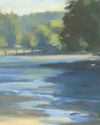
Movement in composition
Through an analysis of three masterworks, landscape painter and noted author MITCHELL ALBALA shows how you can animate landscape composition with movement
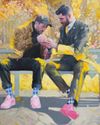
Shane Berkery
The Irish-Japanese artist talks to REBECCA BRADBURY about the innovative concepts and original colour combinations he brings to his figurative oil paintings from his Dublin garden studio

The Working Artist
Something old, something new... Our columnist LAURA BOSWELL has expert advice for balancing fresh ideas with completing half-finished work
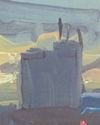
Washes AND GLAZES
Art Academy’s ROB PEPPER introduces an in-depth guide to incorporating various techniques into your next masterpiece. Artwork by STAN MILLER, CHRIS ROBINSON and MICHELE ILLING
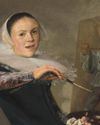
Hands
LAURA SMITH continues her new four-part series, which encourages you to draw elements of old master paintings, and this month’s focus is on capturing hands

Vincent van Gogh
To celebrate The Courtauld’s forthcoming landmark display of the troubled Dutch master’s self-portraits, STEVE PILL looks at the stories behind 10 of the most dramatic works on display
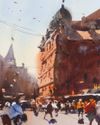
BRING THE drama
Join international watercolour maestro ALVARO CASTAGNET in London’s West End to paint a dramatic street scene
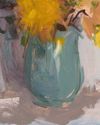
Serena Rowe
The Scottish painter tells STEVE PILL why time is precious, why emotional responses to colour are useful, and how she finds focus every day with the help of her studio wall

Bill Jacklin
Chatting over Zoom as he recovers from appendicitis, the Royal Academician tells STEVE PILL about classic scrapes in New York and his recent experiments with illustration